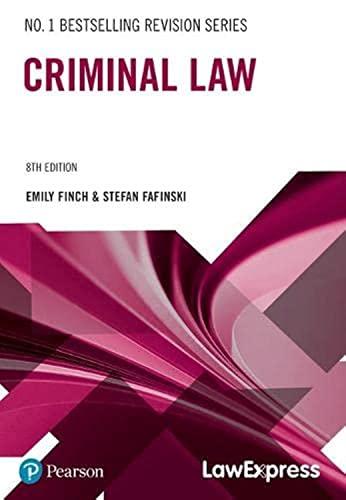Question
Regarding the case Leroy v. Maria, Maria is accused of battery after an incident that happened after a soccer game. Leroy says Maria throwing a
Regarding the case Leroy v. Maria, Maria is accused of battery after an incident that happened after a soccer game. Leroy says Maria throwing a soccer ball at him counts as battery, and he wants compensation for his injuries. To see if Leroy's claim is reasonable, we need to look at two legal cases: Fisher v. Carrousel Motor Hotel, Inc., 424 S.W.2d 627 (Tex. 1967), and Pierson v. Brooks, 768 P.2d 792 (Idaho Ct. App. 1989).
In Fisher v. Carrousel Motor Hotel, the Texas Supreme Court talked about what makes up battery. They said for an action to be battery, it has to be shown that the person meant to cause harm or offensive contact, or they knew it would happen. Just being careless or reckless isn't enough; the person has to have meant to do it.
Similarly, in Pierson v. Brooks, the Idaho Court of Appeals talked about the importance of intent in battery cases. They said intent can be guessed from what happened, but there has to be clear proof. They also said that accidental contact doesn't count as battery unless the person meant to do it.
Looking at what Fisher and Pierson said, it's clear Leroy's claim against Maria doesn't make sense. Maria throwing the soccer ball was to stop a fight, not to hurt Leroy. She didn't plan to hurt him. Also, the situation shows Maria was trying to keep things safe, not to harm Leroy.
Both Fisher and Pierson say it's crucial to tell the difference between actions done on purpose and ones that are accidental. Maria's actions fall into the accidental category because she didn't mean to hurt Leroy. So, Leroy's claim doesn't meet the requirement of intent needed for battery.
Also, there's something called self-defense in the law. Both Fisher and Pierson talk about it. They say people can defend themselves or others if there's a threat of harm. Maria throwing the soccer ball could be seen as her trying to protect herself and others from Leroy's aggressive behavior. So, even if Maria did it on purpose, it might be allowed under self-defense.
Another thing to think about is comparative fault. This means if the person who got hurt also did something wrong, they might not get full compensation. Both Fisher and Pierson talked about this too. Leroy's actions, like being aggressive towards Brian, might have made the situation worse. So, his claim against Maria should be considered less because of that.
In conclusion, what Fisher and Pierson say supports dismissing Leroy's battery claim against Maria. Maria didn't mean to hurt Leroy; she was trying to keep things safe. Also, self-defense and comparative fault mean Leroy's claim doesn't make sense. So, we ask the court to dismiss Leroy's claim against Maria.
REPHRASE
Step by Step Solution
There are 3 Steps involved in it
Step: 1

Get Instant Access to Expert-Tailored Solutions
See step-by-step solutions with expert insights and AI powered tools for academic success
Step: 2

Step: 3

Ace Your Homework with AI
Get the answers you need in no time with our AI-driven, step-by-step assistance
Get Started


